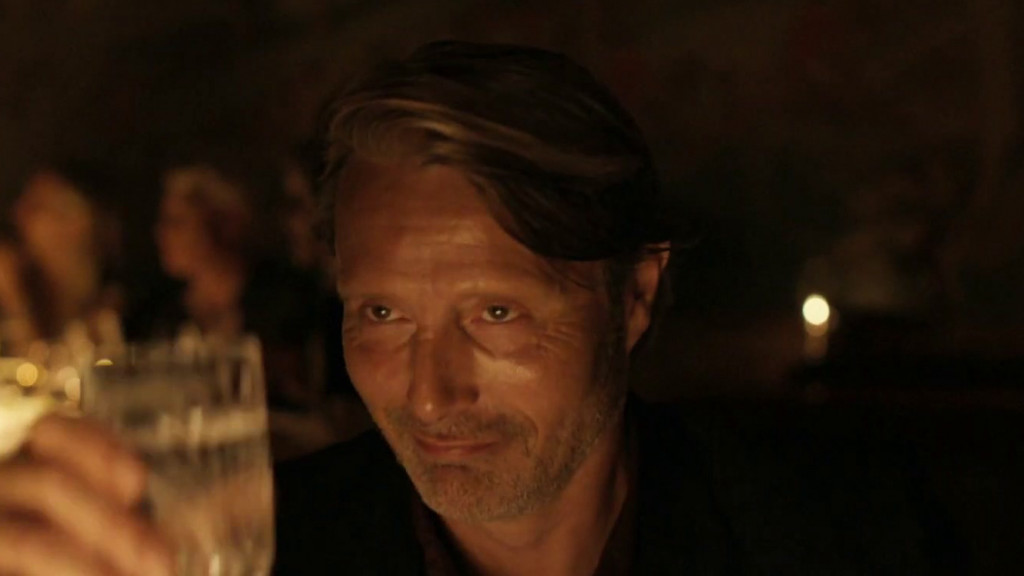Another Round is on general release in the UK after a release schedule that was heavily disrupted by the Covid pandemic and as such has already won an Oscar, a Bafta and many, many awards.
What’s Going On?
Four middle-aged teacher friends decide to revitalise their lives by constantly having their blood alcohol content be at 0.05% after reading an article by a psychiatrist suggesting that is the optimal state for humans. This small amount of alcohol relaxes you, makes you slightly more confident and brings out your best without getting towards the negative impacts of alcohol. The four set clear rules for their “experiment” and set off to see what will happen and how it will impact their lives.
Behind the Scenes
The film is directed by Thomas Vinterberg and written by Vinterberg and Tobias Lindholm. Vinterberg is the co-founder of the Dogme 95 filmmaking movement and director of The Hunt and Far From The Madding Crowd. Lindholm has collaborated on a number of films with Vinterberg.
In Front of the Camera

The four leads are Mads Mikkelsen (Martin), Thomas Bo Larsen (Tommy), Magnus Millang (Nikolaj) and Lars Ranthe (Peter), and if one character is lead it is Martin. Mads Mikkelsen is a great actor and has been in everything from poker-playing-blood-crying villain Le Chiffre in Casino Royale to Enlightenment-inspired physician Johann Friedrich Struensee in A Royal Affair. It’s easy to take against Mikkelsen – already exceptionally talented he seems to get better looking with each passing year.
Does It work?
Another Round is a great comedy-drama and manages to contain genuine laughs, inspiring moments and horrible bleakness. The experiment is started after Martin breaks down into tears at Nikolaj’s 40th birthday party about how he isn’t happy, how he and his wife don’t talk and how he doesn’t feel like him anymore. In his younger days he was a little wild, he practised jazz ballet (no, I don’t know what that is either) and was full of passion about teaching but that seems to have ebbed away. Each of the four has their own sadness: Nikolaj weighed down by family life and problems with his wife, Peter who regrets never having children and Tommy who just seems a little discontented. They all realise they are breaking some very serious societal rules and actual workplace rules so keep it secret.

While alcohol is what they use to bring about the change I don’t think it’s really about alcohol – it’s about unhappiness. If Nikolaj had found an article suggesting a different way perhaps they would have done that or maybe it was just an excuse to give in to bad urges and shrug off responsibilities. All four are prepared to transgress in order to get their happiness, get back what they feel they have lost. The experiment does seem to work well and Martin’s history classes go from boring and disjointed lectures to energised, entertaining and effective lessons. Martin, presumably helping to justify what he is doing, spends time in his history class comparing the relative drinking habits of Winston Churchill, Franklin D Roosevelt and Adolf Hitler – the first two being famous for their alcohol consumption whereas Hitler being far more abstentious.
The film does show the full gamut of the behaviour caused by drinking – pleasantly relaxed, hedonistic excess, poor choices, good-natured fun, despair, indignity and shame but is by no means an anti-drinking or pro-drinking film. There is no prohibition theme of the inherently destructive nature of drinking nor an uncritical celebration of the enjoyment people have when drinking.
As could probably be deduced this experiment has a share of problems but it shows an attitude and perspective rarely seen in films. There is not an easy lesson to be learned, there is no judgement and moralising. For much of the bad behaviour, there is no comeuppance, there were several times I thought hints were being given to later consequences – but they never happened. There is a Hollywood remake already in the pipeline and I will be fascinated to see if they add in layers of hectoring and tell you the lessons that should be learned.
The film is exceptionally powerful when dealing with the unhappiness in the characters’ lives. I’ve heard the film described as being about a mid-life crisis but there are scenes of much younger people struggling and unable to find happiness and I think to see it purely as about mid-life crisis misses the deeper feelings of the characters. We get the clearest look at Martin’s life – his teaching, his time with his wife, his children – and our perspective of what is going on in his life and the reasons for his unhappiness change over the course of the film. Martin’s life, Anika’s life (this is his wife), his children’s lives are all shown as complex and difficult, with their own challenges, their own pain, their own unhappiness.
The ending of Another Round is genuinely spectacular and very moving and not the ending I was expecting at all. We get to see the true range of Mikkelsen’s talents and are left unsure as to what the future would hold for any of the characters. Speaking of Mikkelsen he is sensational in this film, at times we feel sympathetic and others appalled. The whole cast is very good but I especially also liked Maria Bonnevie who played Anika who had an exceptionally difficult role and was fantastic.
Rating:  (4.5 / 5)
(4.5 / 5)
To sum up, Another Round is a great film – full of complexity, dark humour and first-rate acting.
Also Read: What To Watch When Cinemas Reopen














